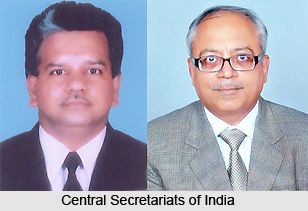 Function and role of Secretaries is essentially to assist and advise the ministers in making various policy decisions. They are the ones who provide the material and aid required to reach the decisions of the various ministers and they also oversee the implementation of such decisions. They assist the ministers in- making and modifying policies from time to time; framing legislation, rules and regulations; sectoral planning and program formulation; budgeting and control of expenditure; according administrative and financial approval to operational plans and programmes and their subsequent modifications; supervision and control over the execution of policies and programmes by field agencies, and evaluation of the results; co-ordination and interpretation of policies, assisting other branches of the government and maintaining contacts with state administrations; initiating measures to develop greater organizational competence; discharging their responsibilities to the parliament.
Function and role of Secretaries is essentially to assist and advise the ministers in making various policy decisions. They are the ones who provide the material and aid required to reach the decisions of the various ministers and they also oversee the implementation of such decisions. They assist the ministers in- making and modifying policies from time to time; framing legislation, rules and regulations; sectoral planning and program formulation; budgeting and control of expenditure; according administrative and financial approval to operational plans and programmes and their subsequent modifications; supervision and control over the execution of policies and programmes by field agencies, and evaluation of the results; co-ordination and interpretation of policies, assisting other branches of the government and maintaining contacts with state administrations; initiating measures to develop greater organizational competence; discharging their responsibilities to the parliament.
In fact, it can be said that the Central Secretariat is the chief executive instrument of the Union Government. It is responsible for administering the Central subjects, coordinating the activities of national importance and assisting in the formulation of foreign, economic and financial policies. Thus on the one hand the Secretariat is the policy-formulating, co-ordinating and supervisory agency, and, on the other, it is the principal executive agency of the Government. For example, the Railway Board, which constitutes the railway ministry, is also the higher operating agency. In fact, when any new activity starts in the secretariat and it gets beyond certain proportions, it is handed over to a field agency created for the purpose. The fact of the matter is that in the history of Indian administration there has never existed a rigid demarcation between the secretariat and field functions.
Owing to a number of factors the secretariat in India has had to concern itself even with details of administration. For one thing, India, being a parliamentary democracy, the secretariat has to collect a lot of information from various sources and agencies to be made available to parliament, particularly by way of replies to questions. Also, the people approach the ministers directly for redress of their individual or group grievances. The Ministers also want to do their best to redress such grievances, thus adding to the work of the secretariat. Moreover, since our polity is a federal one, the task of coordinating the functioning of state governments has to be done by the union government secretariat. Most importantly, the responsibility for carrying out the proclaimed national goals and faithful implementation of the Constitution of India rests particularly on the Union Government.
Thus, due to a combination of all these reasons, the functions and responsibilities of the authority have naturally followed. The superior position of the secretariat is recognised by the secretariat personnel being given higher grades of salaries than their counterparts working in field agencies and field officers being entitled to special pay on their joining the secretariat. Thus the Secretariat plays a rather important role and enjoys a prestigious position in Indian administration.




















